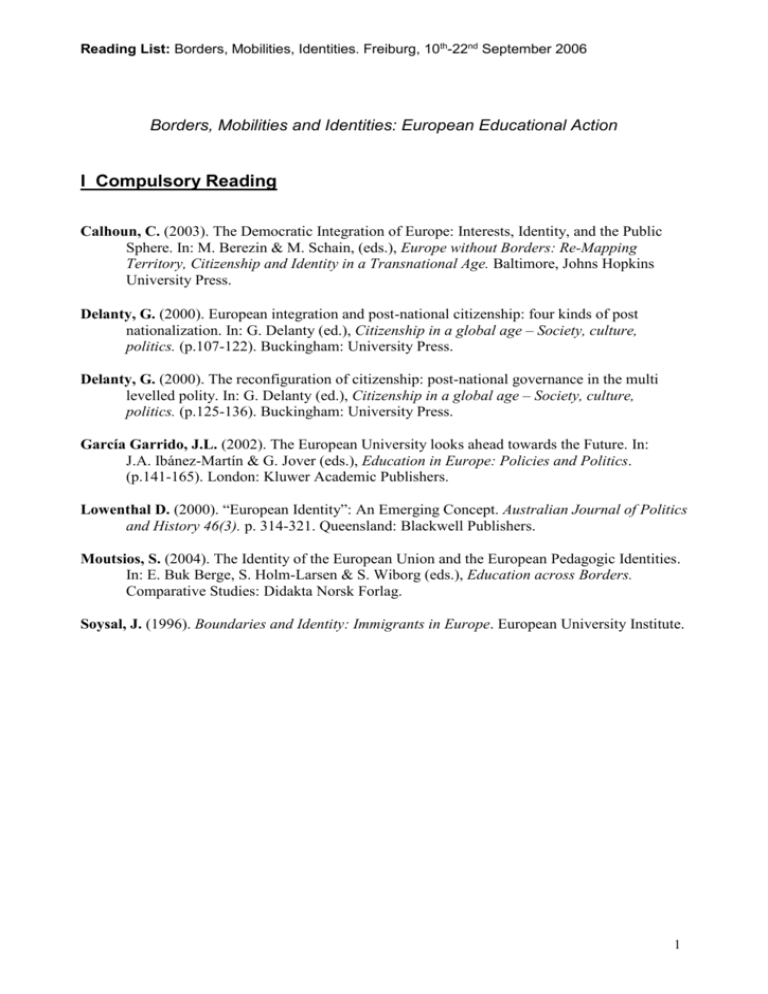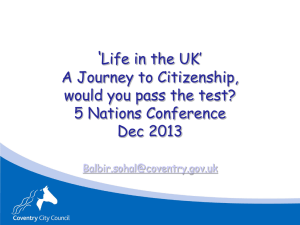List of Literature
advertisement

Reading List: Borders, Mobilities, Identities. Freiburg, 10th-22nd September 2006 Borders, Mobilities and Identities: European Educational Action I Compulsory Reading Calhoun, C. (2003). The Democratic Integration of Europe: Interests, Identity, and the Public Sphere. In: M. Berezin & M. Schain, (eds.), Europe without Borders: Re-Mapping Territory, Citizenship and Identity in a Transnational Age. Baltimore, Johns Hopkins University Press. Delanty, G. (2000). European integration and post-national citizenship: four kinds of post nationalization. In: G. Delanty (ed.), Citizenship in a global age – Society, culture, politics. (p.107-122). Buckingham: University Press. Delanty, G. (2000). The reconfiguration of citizenship: post-national governance in the multi levelled polity. In: G. Delanty (ed.), Citizenship in a global age – Society, culture, politics. (p.125-136). Buckingham: University Press. García Garrido, J.L. (2002). The European University looks ahead towards the Future. In: J.A. Ibánez-Martín & G. Jover (eds.), Education in Europe: Policies and Politics. (p.141-165). London: Kluwer Academic Publishers. Lowenthal D. (2000). “European Identity”: An Emerging Concept. Australian Journal of Politics and History 46(3). p. 314-321. Queensland: Blackwell Publishers. Moutsios, S. (2004). The Identity of the European Union and the European Pedagogic Identities. In: E. Buk Berge, S. Holm-Larsen & S. Wiborg (eds.), Education across Borders. Comparative Studies: Didakta Norsk Forlag. Soysal, J. (1996). Boundaries and Identity: Immigrants in Europe. European University Institute. 1 Reading List: Borders, Mobilities, Identities. Freiburg, 10th-22nd September 2006 II Further Reading Education and Social Cohesion - From State Formation to Identity Formation Amadeo, J-A, Torney-Purta, J, Lehmann, R., Husfeldt, V. & Nikolova,R. (2002). Civic Knowledge and Engagement : An IEA Study of Upper Secondary Students in Sixteen Countries. Amsterdam: IEA. Green, A., Preston J. & Sabates, R. (2001). Education and Social Cohesion: Recentering the Debate. Peabody Journal of Education and Development 76 (3 and 4). Hobsbawm, E.J. (1997). The Curious History of Europe. In: E. J. Hobsbawm (ed.), On History. Weidenfield & Nicholson. Janmaat, J.G. (2002). Identity Construction and Education: The History of Ukraine in Soviet and Post-Soviet Schoolbooks. In: P. D'Anieri & T. Kuzio (eds.), Dilemmas of State-Led Nation Building in Ukraine. Westport CT: Praeger. Smith, A. D. (1997). National Identity and European Identity. In: P. Gowan & P. Anderson (eds.), The Question of Europe. Identity Formation De Beus. J. (2001). Quasi-National European Identity and European Democracy. Law and Philosophy 20. p.283–311. Rotterdam: Kluwer Academic Publishers. Kohli, M. (2000). The Battlegrounds of European Identity. European Societies 2(2).p.113-137. Lehning, Percy B. (2001). European Citizenship towards a European Identity? Law and Philosophy 20. p.239–282. Rotterdam: Kluwer Academic Publishers. Paasi, A. (2001) Europe as a Social Process and Discourse: Considerations of Place, Boundaries and Identity. European Urban and Regional Studies 8(1). p. 7-28. London: SAGE Publications. Prentoulis. N. (2001). On the Technology of Collective Identity: Normative Reconstruction of the Concept of the EU Citizenship. European Law Journal 7(2). p.196-218. Oxford: Blackwell Publishers. Smith, A.D. (1997). National Identity and European Identity. In: P. Gowan & P. Anderson, The Question of Europe. European Educational Policy Europäischer Rat (2000). Europäischer Rat von Lissabon: 23.+24.März2000. Schlussfolgerungen des Vorsitzes. Kommission der Europäischen Gemeinschaften (2000). Memorandum über Lebenslanges Lernen vom 30.10.2000, Brüssel. 2 Reading List: Borders, Mobilities, Identities. Freiburg, 10th-22nd September 2006 Activities of the European Union Education, Training, Youth http://europa.eu.int/pol/educ/print_index_en.htm (2004-06-26) Concrete future objectives of education systems http://europa.eu.int/scadplus/leg/en/cha/c11049.htm (2004-06-26) General Report 2003 CONTENTS (23/49) Chapter V - Citizenship and quality of life Section 3 - Education and culture http://europa.eu.int/abc/doc/off/rg/en/2003/somm022.htm (2004-06-26) Education, Training, Youth: Education http://europa.eu.int/scadplus/leg/en/s19001.htm (2004-06-26) Language and Identity Barbour, S. & Carmichael, C.(2000). Language and Nationalism in Europe. Oxford: Oxford University Press. Bourne, J. & Reid, E. (2003). Language Education. London , Kogan Page (World Yearbook of Education series). Council of Europe (1997). Language Learning for European Citizenship. Final Report (1989 - 96). Strasbourg: Council of Europe Publishing. Osler, A. (2000). Citizenship and Democracy in Schools: Diversity, Identity, Equality. Stoke on Trent: Trentham Books. Osler, A. & Starkey, H. (2000). Intercultural Education and Foreign Language Learning: Issues of Racisim, Identity and Modernity. In: Race, Ethnicity and Education (2). Preuβ, U.K. Reguejo. (1998). European Citizenship, Multiculturalism, and the State. Baden Baden: Nomos. Living the Betweenness: paradoxes and rhetorics (The Multilingual Identity) Alexander. R., Broadfoot, P. & Phillips, D. (1999). Learning for Comparing. Oxford: Symposium Books. Freire, P. & Macedo, D.P. (1995). A Dialogue: Culture, Language and Race. Harvard Educational Review 65(3). p. 377-402. Jarvis, P. (2000). Globalisation, the Learning Society and Comparative Education. Comparative Education 3. p. 343-355. European Union: searching for identity through education Bernstein, B. (1996). Pedagogy, Symbolic Control and Identity: Theory, Research, Critique. London: Taylor & Francis. 3 Reading List: Borders, Mobilities, Identities. Freiburg, 10th-22nd September 2006 Castells, M. (1997). The Power of Identity. Oxford, Blackwell. Isin, E.F. & Wood, P. K. (1999). Citizenship and Identity. London: SAGE Publications. Novoa, A. & Lawn, M. (2002). Fabricating Europe: The Formation of an Education Space. London: Kluwer Academic Publishers. Official Documents European Commission (1995) White Paper on Education and Training: Teaching and Learning - Towards the Knowledge Society. Brussels, COM(95) 590. European Commission (1998) Learning for Active Citizenship: A Significant Challenge in Building a Europe of Knowledge, DGXXII. http://europa.eu.int/comm/education/archive/citizen/citiz_en.html Minorities and Intercultural Education Anderson, B. (1991). Imagined Communities: Reflections on the origin and Spread of Nationalism. London: Verso. Bennett, J.M. (1993). Cultural Marginality. Identity Issues in Intercultural Training. In: R.M. Paige (ed.), Education for the Intercultural Experience. Yarmouth: Intercultural Press. Hall, S. & DuGay, P. (1996). The Questions of Cultural Identity. London: SAGE Publications. Nieto, S. (2000). Affirming Diversity. The Sociopolitical Context of Multicultural Education. Third Edition. New York: Addison Wesley Longman. Paasi, A. (1996). Territories, boundaries and consciousness - The changing geographies of the Finnish-Russian border. Chichester: John Wiley. ‘Teaching & Learning Europe’ Lewicka-Grisdale, K. & Mc Lauglin, H.(2002). Education for European Identity and European Citizenship. In: J.A. Ibánez-Martín & G. Jover (eds.), Education in Europe. (p. 53-81). London: Kluwer Academic Publishers. Comparative Education Watson, K. (2001). Introduction: Rethinking the role of Comparative Education. In: K. Watson (ed.), Doing comparative education research – issues and problems. (p.9-20). Oxford: Synposium Books. Skolpol, T. & Somer, M. (1980). The Uses of Comparative History in Macrosocial Inquiry. Comparative Studies in Sociology and History 22(2). 4







